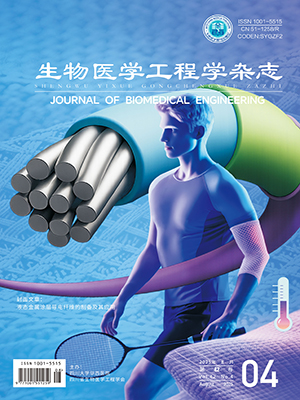| 1. |
何成. 基于多生理信号的情绪识别方法研究. 杭州: 浙江大学, 2016.
|
| 2. |
Cai Wenjie, Hu Danqing. QRS complex detection using novel deep learning neural networks. IEEE Access, 2020, 8: 97082-97089.
|
| 3. |
Pan J, Tompkins W J. A real-time QRS detection algorithm. IEEE Trans Biomed Eng, 1985, 32(3): 230-236.
|
| 4. |
Wang Zhiguang, Yan Weizhong, Oates T. Time series classification from scratch with deep neural networks: A strong baseline// 2017 International Joint Conference on Neural Networks (IJCNN). London: IEEE, 2017: 1578-1585.
|
| 5. |
Gao Hongxiang, Liu Chengyu, Wang Xingyao, et al. An open-access ECG database for algorithm evaluation of QRS detection and heart rate estimation. J Med Imaging Health Inform, 2019, 9(9): 1853-1858.
|
| 6. |
Liu Feifei, Liu Chengyu, Zhao Lina, et al. An open access database for evaluating the algorithms of electrocardiogram rhythm and morphology abnormality detection. J Med Imaging Health Inform, 2018, 8(7): 1368-1373.
|
| 7. |
Wagner P, Strodthoff N, Bousseljot R D, et al. PTB-XL, a large publicly available electrocardiography dataset. Sci Data, 2020, 7(1): 154.
|
| 8. |
Gao Hongxiang, Liu Chengyu, Shen Qqin, et al. Representative databases for feature engineering and computational intelligence in ECG processing// Liu C, Li J. Feature engineering and computational intelligence in ECG monitoring. Singapore: Springer, 2020: 13-29.
|
| 9. |
朱虹, 邹学良, 钟志军, 等. 年轻慢性失眠患者睡眠期间的心率及心率变异性对照研究. 中国临床心理学杂志, 2024, 32(5): 1155-1159.
|
| 10. |
Porges S W. The polyvagal perspective. Biol Psychol, 2007, 74(2): 116-143.
|
| 11. |
Hsueh B, Chen R, Jo Y, et al. Cardiogenic control of affective behavioural state. Nature, 2023, 615(7951): 292-299.
|
| 12. |
Gao Hongxiang, Wang Xingyao, Chen Zhenghua, et al. ECG-CL: A comprehensive electrocardiogram interpretation method based on continual learning. IEEE J Biomed Health Inform, 2023, 27(11): 5225-5236.
|
| 13. |
茶兴增, 张月, 张翼飞, 等. 基于两阶卷积神经网络训练有限心电数据的心脏骤停早期分类识别算法. 生物医学工程学杂志, 2024, 41(4): 692-699.
|
| 14. |
Sabor N, Gendy G, Mohammed H, et al. Robust arrhythmia classification based on QRS detection and a compact 1D-CNN for wearable ECG devices. IEEE J Biomed Health Inform, 2022, 26(12): 5918-5929.
|
| 15. |
Hu Jie, Shen Li, Sun Gang. Squeeze-and-excitation networks// Proceedings of the 2018 IEEE Conference on Computer Vision and Pattern Recognition (CVPR). New York: IEEE, 2018: 7132-7141.
|
| 16. |
Moody G B, Mark R G. The impact of the MIT-BIH arrhythmia database. IEEE Eng Med Biol Mag, 2001, 20(3): 45-50.
|
| 17. |
Soleymani M, Lichtenauer J, Pun T, et al. A multimodal database for affect recognition and implicit tagging. IEEE Trans Affect Comput, 2011, 3(1): 42-55.
|
| 18. |
Strodthoff N, Wagner P, Schaeffter T, et al. Deep learning for ECG analysis: Benchmarks and insights from PTB-XL. IEEE J Biomed Health Inform, 2021, 25(5): 1519-1528.
|
| 19. |
Guendouzi F, Attari M. QRS complex detection in ECG signals using empirical wavelet transform and flower pollination algorithm. Period Polytech Electr Eng Comput Sci, 2022, 66(4): 380-390.
|
| 20. |
Tueche F, Mohamadou Y, Djeukam A, et al. Embedded algorithm for QRS detection based on signal shape. IEEE Trans Instrum Meas, 2021, 70: 1-12.
|
| 21. |
Güngör C B, Mercier P P, Töreyin H. A stochastic resonance electrocardiogram enhancement algorithm for robust QRS detection. IEEE J Biomed Health Inform, 2022, 26(8): 3743-3754.
|
| 22. |
Wang Xingyao, Li Yuwen, Gao Hongxiang, et al. A causal intervention scheme for semantic segmentation of quasi-periodic cardiovascular signals. IEEE J Biomed Health Inform, 2023, 27(7): 3175-3186.
|
| 23. |
Yang Shunxiang, Cheng Lian, Zeng Zigang, et al. A multi-view multi-scale neural network for multi-label ECG classification. IEEE Trans Emerg Top Comput Intell, 2023, 7(3): 648-660.
|
| 24. |
Wang Ning, Feng Pangang, Ge Zhaoyang, et al. Adversarial spatiotemporal contrastive learning for electrocardiogram signals. IEEE Trans Neural Netw Learn Syst, 2023, 35(10): 13845-13859.
|
| 25. |
Zhang Jing, Liang Deng, Liu Aiping, et al. MLBF-Net: A multi-lead-branch fusion network for multi-class arrhythmia classification using 12-lead ECG. IEEE J Transl Eng Health Med, 2021, 9: 1-11.
|
| 26. |
Prabhakararao E, Dandapat S. Multi-scale convolutional neural network ensemble for multi-class arrhythmia classification. IEEE J Biomed Health Inform, 2021, 26(8): 3802-3812.
|
| 27. |
Zhang Wenrui, Yang Ling, Geng Shijia, et al. Self-supervised time series representation learning via cross reconstruction transformer. IEEE Trans Neural Netw Learn Syst, 2023, 35(11): 16129-16138.
|




